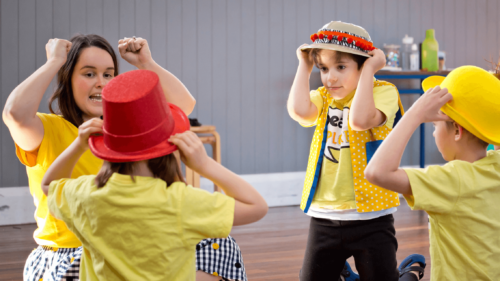If your child tells you they want to be a musician, you encourage them to learn an instrument. If they tell you they want to be the next Ash Barty, you sign them up for tennis lessons. Perhaps they come to you with aspirations of being a chef; you book them into a cooking class.
Every parent wants their child to be able to achieve their dreams, so they put them into extra-curricular activities that will help prepare them for life beyond school.
So for what reason should you put your child into drama classes? Well of course, if your kids have aspirations of becoming an actor then joining a speech and drama class is a good place to start. Out of the 800+ students attending Brisbane drama school Speak Up Studio, most have quite different life goals than becoming an actor. So why have they joined these popular classes?
Drama is about more than just ‘acting’.
Drama classes are about more than just producing the next Hugh Jackman. Drama equips children with invaluable skills that set them up for success in school and beyond.
10 key skills kids learn in a drama class at Speak Up Studio
Empathy
In the drama classroom differences are celebrated. Teachers are empathic and gentle with students, which in turn teaches them to do the same with others.
Playing ‘roles’ in drama gives young people the opportunity to understand those who may seem different to themselves. Teachers take the time to learn the layers behind characters and their choices – therefore inspiring us to do the same with the people we meet in our real life.
Tolerance
Did you know kids can annoy one another? Who would have thought? (Can you sense the sarcasm through my keyboard?) Inspired by skills in empathy, and striving for positive collaboration, drama teaches tolerance to young people. It teaches them to understand others’ behaviours and respond in appropriate ways.
Collaboration & Teamwork
Putting on a show, no matter how big or small, requires multiple people working together behind the scenes.
You’ll notice very quickly, while working on any given drama production, that the success of a show relies on the contribution and collaboration of everyone involved. Speak Up’s classes are therefore built on teamwork, cooperation and support.
Independence
At the other end of the spectrum, drama teaches independence. Speak Up’s teachers ensure tasks are assigned (particularly for older students) such as learning lines and character to work on independently. It’s the student’s responsibility to know their lines and be prepared.
Initiative & Dedication
Drama productions in particular demand that individuals are willing and ready to step up at any time. As drama kids grow, they learn the importance of their own initiative to step up and step in to help the show succeed.
Drama students quickly learn that putting the time into their class, rehearsals and show, is what makes drama and being on stage feel so deeply rewarding.

Respect
Working towards a performance in drama teaches students to respect and rely on each other, including trusting in each other’s abilities.
Working under a teacher in the classroom or a director in rehearsals, teaches us how to respect authority, but also how we should be treated by our superiors – with kindness. Respect developed for classmates and teachers, directly translates into respect for future relations beyond school.
Flexibility & Adaptability
Drama people are champions of being flexible and adapting to change. This is taught in the Speak Up classroom through drama games and improv exercises. Teachers will also loosely follow a lesson plan if students are expressing particular passions and interests.
The uncertainty of life means you have to be able to problem solve and think on your feet. Drama kids are taught to be ready to try new things, accept new challenges and live in a world that’s constantly changing.
Self-confidence
Once you’ve performed on stage and heard the applause of an audience, you feel like you can do anything! Drama and performance grows young people’s self-confidence as they are put into unfamiliar territory (on display on a stage) and then get that amazing feeling of success.
Individuality & Authenticity
Individuality is celebrated in the drama classroom, which inspires our kids to be authentic. It’s not uncommon for the drama classroom to be considered an especially safe place for young people in the LGBTQI+ community to be out.
Speak Up teachers value students’ interests, personalities and self-presentation, and encourage them to not only be confident and comfortable individuals, but also help others to feel the same.
“Failure” and resilience
One of the greatest things you’ll learn about in drama is “failure.” This includes what failure looks like, how it feels to make mistakes and most importantly of all, how to learn from it and bounce back.
It may be that you don’t get the part you auditioned for, or you forgot a line at the performance – drama teaches you that there’s always a next time. Remember practice makes progress.
So is drama right for your child?
Take a look at the list above and consider how many of these skills can be applied to careers outside of the arts Industry
- A football star needs teamwork skills, flexibility, dedication & resilience
- A doctor needs confidence, respect & independence
- A teacher requires individuality, initiative & tolerance
So, what does your child want to be when they grow up? No matter the answer, drama can help them succeed at their dreams.
Find out more about Speak Up Studio’s speech and drama classes around Brisbane here. www.speakupstudio.com.au









